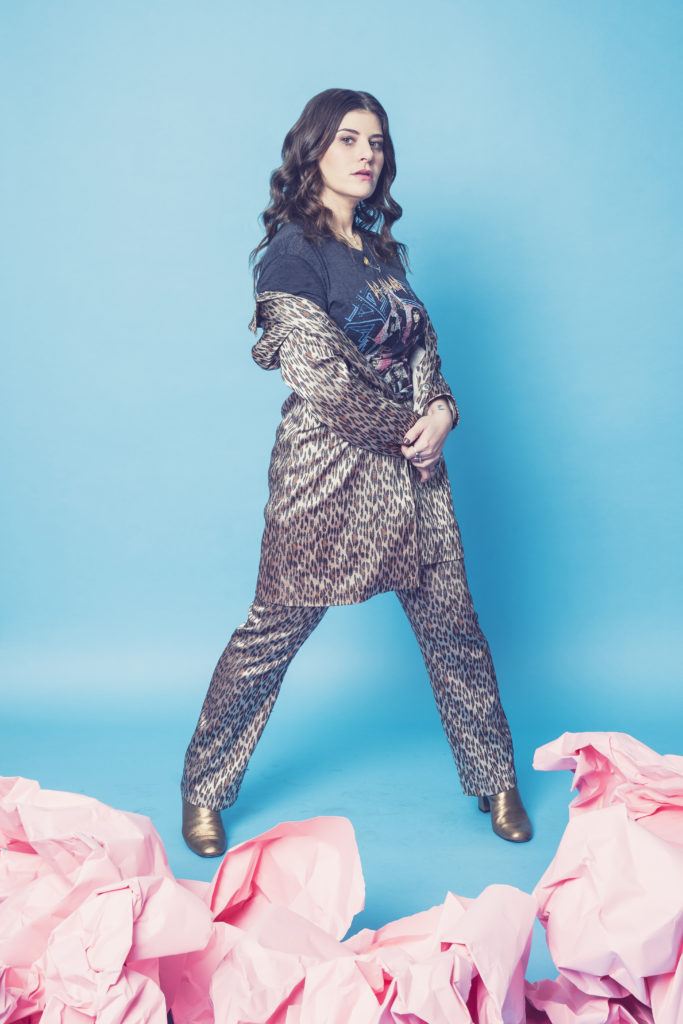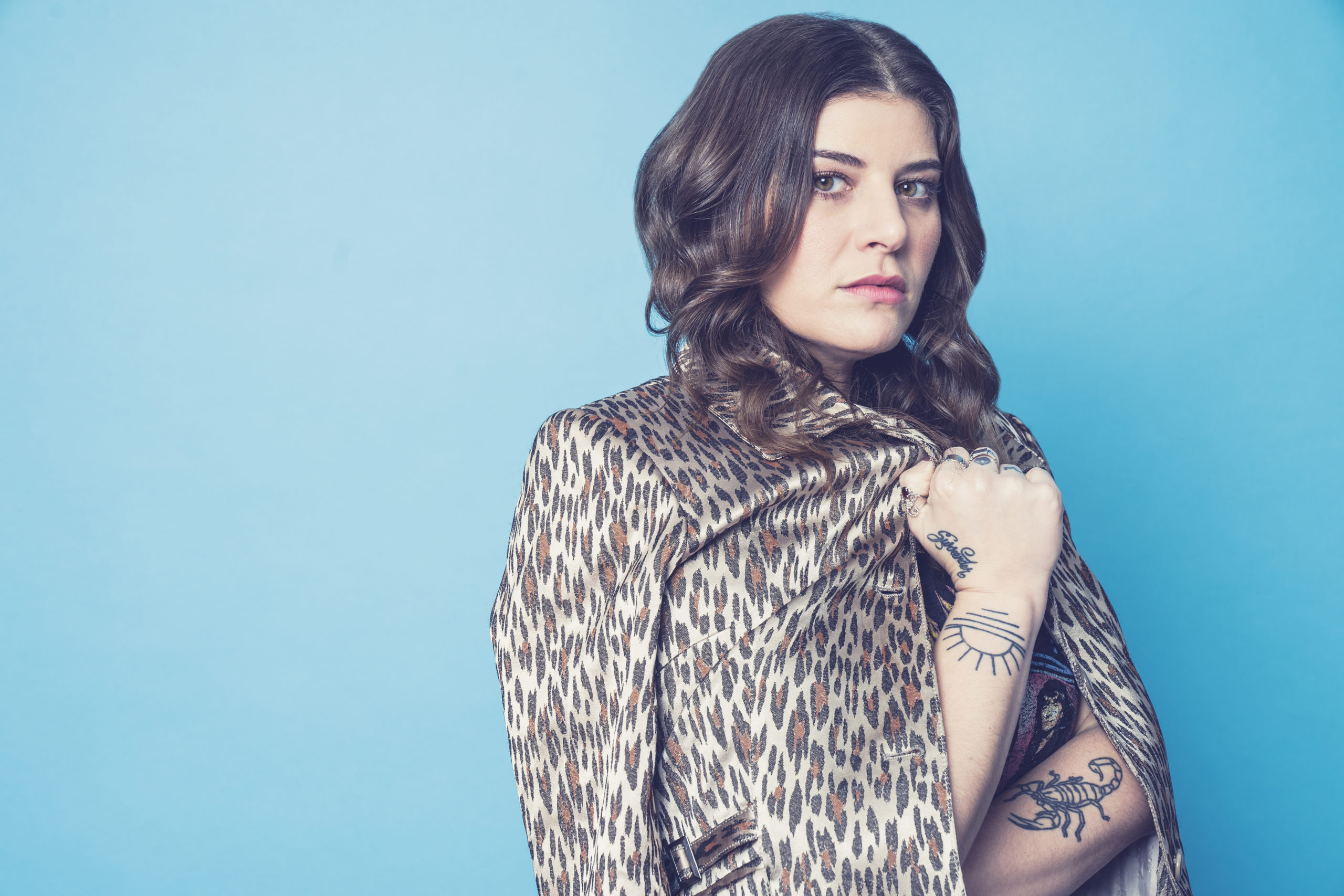Ask an only child, and the bum rap that only children get is completely undeserved. We’re not selfish, needy, or spoiled; OK, maybe we are a little weird or awkward or bad at not being the center of attention. Or maybe we just seem bizarre because, you know, only one in five people in the U.S. has no siblings—which means no peers in the same home to ask how to handle that first high school crush, turn to when our parents are fighting, or explain our dynamic with the class bully. We tend not to learn that we don’t have to do everything on our own—that we not only can, but should ask other people for help—until we’re at least in our mid-twenties.
“Oh god,” Bethany Cosentino laughs upon learning that she’s speaking with another only child. We discover that we’re both only children about ten minutes after the Best Coast frontperson admits that, in 2016, when she was simultaneously campaigning for Bernie Sanders (she’s still on board for 2020) and appearing on The Daily Show as a de facto leader of the fast-gestating, pre-#MeToo music industry anti-sexism movement, she loved being “in a position where anybody valued what I have to say or what my thoughts are.” Turns out those stereotypes about only children being self-centered and needing attention sometimes manifest as activism, even if Cosentino says that becoming a spokesperson against music industry sexism and abuses of power (she spoke out against disgraced publicist Heathcliff Berru’s history of sexual assault, then known only to a whisper network, and unintentionally became a national face for the then-nascent movement) “thrust me into this other spotlight… It happened so fucking fast.”
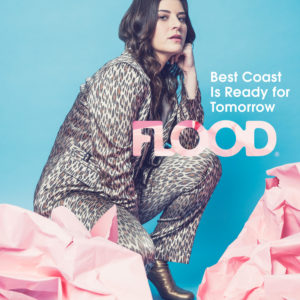
Cover design by Jérôme Curchod
The spotlight she’s better known for also came out of nowhere. When Cosentino started Best Coast in 2009, she was a college dropout demoing songs on the floor at her mother’s apartment. It didn’t take long for her first singles to catch on, though not always to favorable response. That backlash, which at first existed only outside critical circles, has continued to some extent throughout her career and has often caused her intense mental anguish, which she previously masked with publicly visible substance abuse and caricature-like apathy.
Even before Best Coast broke through in the summer of 2010, certain music fans dismissed Cosentino as incapable of writing lyrics beyond the typical: getting high, thinking nonstop about the boy she’s crushing on, absolutely loving that Cali lifestyle. Her first single, in 2009, was titled “Sun Was High (So Was I),” and two songs from her breakthrough 2010 album, Crazy for You, rhymed any of the three following words with one or two of the others: “lazy,” “crazy,” “baby.”
Cosentino directly addresses these early criticisms on “Everything Has Changed,” the second single from the fourth and newest Best Coast album, Always Tomorrow. “They used to call me the lazy crazy baby,” she sings atop a crunching, one-two power chord riff that leans way more good ol’ rock ‘n’ roll than the lo-fi surf pop for which Best Coast first became known. “Did they think that maybe I was in on it?” she continues. “No, of course they didn’t,” she concludes. But as the song suggests, she was in on it.
“Everyone assumed I was this dumb, naive little girl—I knew!” she explains of those early “lazy, crazy, baby” days. The biggest hits by the musicians that inspired her early work—The Mamas and the Papas, Lesley Gore, The Ronettes, The Shangri-Las, the whole Phil Spector catalog—were “all about pining after somebody,” Cosentino says, “so I wanted to take my own life experiences of pining after somebody and replicate them in ways that these artists did in that era, because that type of music brought me back to making music. I knew what I was doing. I was crafting a narrative and paying tribute to a genre that inspired me to start the band in the first place, so I didn’t really let [early criticism] get to me.”
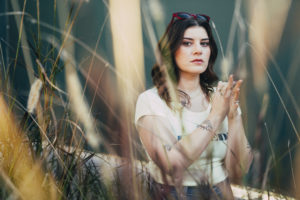
Like any only child, though, Cosentino did eventually let the insults and derision wear her down. “When you’re an only child and you’ve had dysfunctional shit in your past”—Cosentino and I eventually come to learn that we’re both also products of divorce—“you have no coping skills.” Always Tomorrow is the story of what happens when you finally learn to deal with life’s onslaught of emotional obstacles in a healthy way, even if you’re arriving late to the game. Sure, it’s an album about getting sober, but more than that, Cosentino says it’s about “my life over the last ten years and certain thoughts, feelings, and emotions I’ve had to learn to process, and things I’m still learning to process… It gets better, but you don’t always get better right away.”
Not that Cosentino’s Los Angeles childhood was especially rough at first. “I was raised in this world of creativity,” she recalls. Her dad is a musician and her mom is an artist, and they noticed that she “acted a lot, sang in front of everybody, and was sort of a ham—plus, as an only child, I was like, ‘Give me attention!’—my parents saw that in me…and did what they could to fortify that.” She wound up appearing in “like, four commercials” as a kid, far fewer than the oft-ascribed “Bethany Cosentino was a child actor prior to Best Coast” narrative might lead fans to believe.
“I freaked out. I tried to quit that record many times. I would pull over on the side of the freeway and start bawling my eyes out.”
Although her parents nurtured her artistic impulses, Cosentino doesn’t particularly remember her mom and dad getting along. “I love both of them so much, and they did the very best that they could, but I was exposed to some wild shit,” she says. “Their relationship was so dysfunctional, and I thought that was what love looks like. When my parents got divorced [when I was fifteen]…I was like, ‘Wait a second, I don’t know a life without you two together, and what do you mean all of a sudden, the chaos comes to a hush?’”
One way to bring the noise back might be to start making heavily distorted, reverb-shrouded surf pop with a sense of youthful fantasy. Cosentino eventually got to that, but first came the drinking. As she figured out how to cope with the fallout of her parents’ divorce, she recalls thinking, “This thing that I’ve always known for my whole life is over. I gotta do something different… I can just start numbing myself.” Substance abuse and self-destructive behavior resulted, as did a pattern of behavior she only recently ditched: Sprinting away from challenges instead of addressing them.
“My usual move…up until a few years ago was, when something was overwhelming, I just ran from it,” Cosentino says. Drinking oneself into a haze is a solid way to figuratively run from problems, but just a few years after Cosentino had her first drink, she embarked on a much more literal runaway move and shipped all the way across the country to New York for college. It didn’t last.
“I had this big idea of what New York was like,” she says. “I had visited before, but I had never known anything other than living in Los Angeles, because it’s where I grew up.” New York overwhelmed her, so she ran again—this time, to her mother’s apartment, where she began writing the first Best Coast songs.
As she pieced together her first demos, she thought of her friend Bobb Bruno, with whom she’d played in the band Pocahaunted, and discovered a massive overlap in musical tastes and influences. She reached out to Bruno to see whether he’d be down to hear her demos. He didn’t hesitate before accepting.
“I could just see how talented she was,” Bruno remembers thinking from the moment he first saw Cosentino playing in Pocahaunted well over a decade ago. “Years later, when she wanted to do Best Coast, I didn’t even think twice about it.” It didn’t take long for Bruno’s bedroom to become Best Coast’s recording space, and minor internet buzz and some LA shows followed. Then came the record deal. As Cosentino recounts, the next two years were a blur.
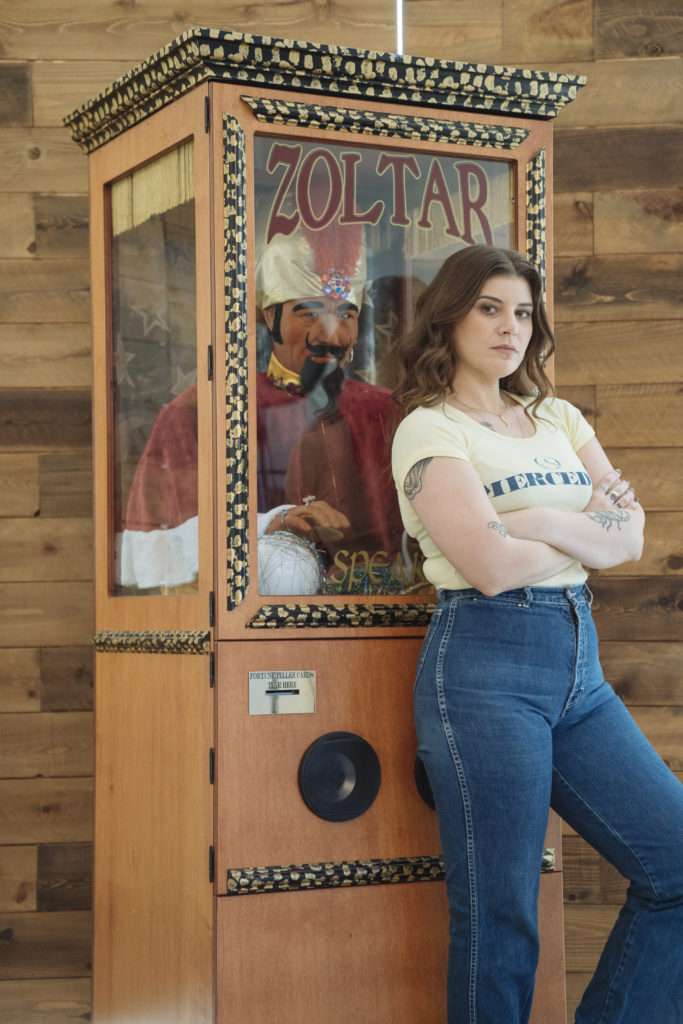
Seemingly overnight, Cosentino says, “We were touring, we were on David Letterman, and Crazy for You was on the Billboard charts. It was just like, bam, it happened. When your life goes from college dropout to [buzzy indie musician]…you have no idea how to handle that.” When she describes who she was during the Crazy for You era, she quotes Britney Spears: “Not a girl, not yet a woman.”
Ten years on from her debut, it’s all but expected that Cosentino would reference an iconic pop star. Although the simple power chords, pervasive fuzz, and beachside listlessness that dominated Crazy got Best Coast lumped in with the then-peaking surf rock movement, the album’s pop influences are about as subtle as the fact that the band name “Best Coast” is an allusion to the West Coast. Crazy’s lead single “When I’m With You” moves through about three different, highly distorted chords in chronicling a thriving young love through simple language, but the song is all hooks thanks to Cosentino’s unabashed girl group idolatry. Not everyone got the idea.
“I was getting a shitload of criticism,” Cosentino says of the Crazy era, including accusations that she was anti-feminist. But “I don’t feel there’s any validity [to those claims],” she adds, so they didn’t phase her all that much. She understood what she was doing, even if other people didn’t, and she “wasn’t dealing with the real dark shit yet.”
Or maybe she just wasn’t registering it. “The majority of the time that my band was taking off, I was stuck in a dark daze,” she says in the official bio accompanying Always Tomorrow. “My romantic relationship was a topic of conversation…my drug and alcohol abuse was on public display. Every day was like Groundhog’s Day—I was repeating the same self-destructive patterns day in and day out,” the bio continues. If it sounds like dissociation, that tracks—Cosentino says that her insane reality only hit her when it came time to put together Crazy for You follow-up The Only Place.
“The criticism of ‘This girl only knows how to write the same song’ became my reality.”
“That really was one of my darkest periods,” she says. “I was so depressed. I had dissociated the first two years, and then all of a sudden, my life was closing in on me.” The pressure to follow up the almost spontaneous success of Crazy for You, the lack of sleep and energy that comes with extensive touring, the fear of the dreaded sophomore slump, the new album’s recording with esteemed Fiona Apple and Kanye producer Jon Brion at Capitol Records instead of, you know, in a makeshift practice space—it all wrecked her.
“I freaked out,” she continues. “I tried to quit that record many times. I would pull over on the side of the freeway and start bawling my eyes out.” Bruno, whom she describes as her “backbone,” kept her on track. His confidence in, and empathy for, his bandmate has never waned.
“The thing I seem to say to her the most is, ‘You got this.’ I know there’s a lot of work she does that has nothing to do with the music side of this band,” Bruno says, placing himself in her shoes as the best empaths do. “When the band first started, she was really young, and I can’t even imagine what it would be like if I was her age going through that [non-music] stuff.”
This non-music work is the side that we fans, listeners, journalists, and critics all see and, unless we take the time to consider it more deeply, come to know not as the capitalist cycle it is, but as a set of actions inherent to releasing an album: giving countless interviews, playing sessions at radio stations and streaming service offices, flying across the country to appear on late-night TV, doing all kinds of promotional work that has little to actually do with making music. Dig deeper, and it only makes sense that these non-musical activities could quickly burn out, and build resentment in, an artist interested in music and only music. Now imagine having to do all that and getting intensely negative feedback?
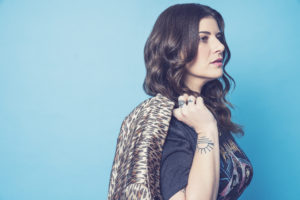
Cosentino doesn’t have to imagine what that’s like. “I used to cry myself to sleep / Reading all the names they called me,” she sings on “Everything Has Changed,” and it’s not an exaggeration. As the lukewarm reception to The Only Place became apparent, Cosentino—despite her image as someone too cool to care what others think—began taking people’s opinions about her art as indisputable facts. “The criticism of ‘This girl only knows how to write the same song’ became my reality,” Cosentino says; it’s another criticism she acknowledges on Always Tomorrow, during the pre-chorus of the pop-punk anthem “Wreckage.” She adds that people far more famous than her have struggled to prevent negative criticism from warping their realities: “I just watched the Taylor Swift documentary [Miss Americana],” she says, noting that Swift “placed a lot of value on what other people thought of her, and that was very much how I was too.”
If Swift represents the best-case scenario for wringing mainstream success from personal strife no matter her genre of choice, then Cosentino might as well be her alt-rock sister. Following the unenthusiastic response to the late ’70s pop-rock stylings of The Only Place (the album’s description on Google Play Music and YouTube Music is still a review that praises its new, polished musical direction while unsparingly lambasting its lyrics) Cosentino leaned into straightforward rock music on 2013’s boisterous, overdriven mini-album Fade Away and 2015’s more shoegaze-indebted California Nights (named after, of course, the Lesley Gore song). It’s easy to hear the thumbprints of Always Tomorrow in the latter release, but Cosentino didn’t immediately continue down that album’s path. If anything, California Nights was a facade.
“My persona on [California Nights] was very much like, ‘I’m different, I’ve changed!’” she says. “I lied through my fuckin’ teeth. It did light a fire for me in creating a different sound and starting to grow, but it wasn’t a fully-fledged vision at the time.” California Nights ultimately proved popular, but for Cosentino, being celebrated as she faked growing up and doing better (the album’s opener, “Feeling OK,” was wishful thinking at best) creatively paralyzed her: “Well, fuck, now I have to top that,” she remembers thinking. “Now I have to make something better. Now I have to change.”
It was while she toured California Nights in 2016 that she appeared on The Daily Show and campaigned for Bernie Sanders. “I was really, really, really acting like I had my shit together in a public way, and behind closed doors, I did not have my shit together,” she says. “To be dealing with so much of what I was dealing with but to be going out on TV with a smile on my face…I was walking through life with this mask on.”
I want Bernie Sanders to be my surrogate grandfather and take me out for breakfast at a diner
— Best Coast (@BestCoast) November 15, 2015
In November of that year, Drumpf won the election. Gunning so hard for Bernie and against sexism to that end result? It broke Cosentino, as it did so many others. Her depression reared its head more aggressively than ever, and she treated it with wine and every episode of Vanderpump Rules available on Hulu. It would wind up taking roughly a year—and a closet full of “crystals, candles, and New Age-y woo-woo shit”—for her to write new music.
“One day, I locked myself in my closet and I forced myself to write,” Cosentino says in the Always Tomorrow bio. “It was the first time in years I was able to get something out. And out came ‘Everything Has Changed.’” If the story sounds dramatic, that’s because it’s exaggerated to some degree: “It’s a walk-in closet,” Cosentino clarifies. The setting change nevertheless proved crucial: “I always write sitting on the floor,” she says. “[The closet] felt like a safe place to go.”
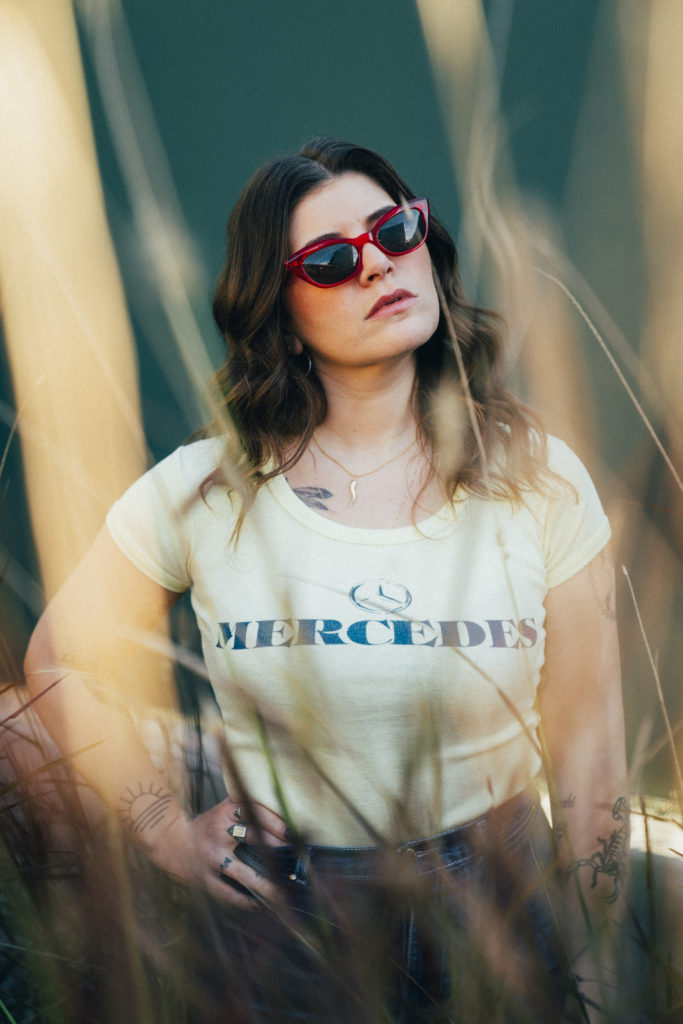
“Everything Has Changed” wound up forecasting Cosentino’s future. “Now I’m walking a little dog on a leash,” she sings in the second verse; she has a chihuahua mix, Josie, who’s best friends with her cat and longtime unofficial Best Coast mascot, Snacks. “I used to drink / Nothing but water and whiskey / Now I think / Those were the reasons why / I used to fall,” she confesses during the first verse; she’s now been fully sober for over two years.
“I thought life was the problem,” Cosentino says of her pre-sobriety years. “I never thought that the way that I masked my feelings with drugs and alcohol was an issue.” To get to sing that lyric from a place of sobriety, she says, “feels really good.”
Not that sobriety necessarily comes easy. “I am the same way that I used to be / Took away substances / That’s the only change I see,” she sings with full confidence and lucidity on the Always Tomorrow highlight “Rollercoaster,” a rock tune that sways lightly while snarling subtly. Throughout the track, Cosentino reckons with sobriety at once equipping her to combat her anxieties and centering her fears more loudly than ever (the song is also about Snacks aging). “I was used to not feeling things,” she says. “The drugs and alcohol are gone, but I’m still me.”
“I thought life was the problem. I never thought that the way that I masked my feelings with drugs and alcohol was an issue.”
Always Tomorrow often plays out like Cosentino coaching herself on how to power through emotional obstacles without using substances. “I’m trying harder than I ever have before / Used to think that taking care of myself would just become a real bore,” she sings on the gentle, tropical soft rock shimmy “For the First Time” before addressing the tenuousness of that change: “I finally feel free / I feel like myself again / But for the first time.” On “Master of My Own Mind,” which starts as an upbeat pop-punk charge before reaching a midtempo, introspective interlude, she advises herself, “Even when I’m drowning in my sorrows / Gotta focus / Gotta rewind / Gotta stay the master of my own mind.” And the album’s final lyric, from “Used to Be,” is “Accepting the unknown,” which Cosentino sings over a stomping, slightly ominous shoegaze chord progression, as though to close the album by saying, Not worrying so much, not reacting so strongly to external stimuli, is the path forward—but obstacles will always be there.
“We’re left to our own devices to figure these things out,” Cosentino says of her newfound coping mechanisms. “Nobody teaches us that stuff unless we have really healthy parents or we hit some sort of bottom in our lives and decide to go to therapy… We don’t deserve to go through life running from our fears and carrying this shit from our childhood with things popping up and us being like, ‘Why does this keep happening?’”
To that end, she’s now able to accept interpretations like the one I present for “Used to Be” without resorting to old habits such as getting mad, feeling misunderstood, or telling me I’m wrong. “I love that people can take this shit and dissect it however they want to. I take no offense to that,” she says. “I used to get so pissed,” she admits, which is a reaction that’s roughly the opposite of what she gives me: “That’s fuckin’ awesome!” Of course, Cosentino has owned up to previously veiling her turmoil with exuberance, but she insists there’s no reason to be suspicious of her current happiness. “I feel good,” she says, “and I want to scream it from the mountaintops.” FL
